
This article discusses the importance of hiring reliable renovation contractors for commercial projects. It explores factors to consider when selecting a commercial renovation contractor and outlines key steps in planning such a project.
Additionally, it addresses common challenges faced during office renovation and offers strategies for overcoming them. The role of a project manager in a commercial renovation project is also examined, along with best practices for effective communication and collaboration with contractors.
Furthermore, the article highlights the significance of understanding permitting and regulatory requirements, as well as evaluating and selecting appropriate materials and finishes.
Finally, it emphasizes the importance of quality assurance and inspection in ensuring successful commercial renovation projects.

Table of Contents
The Importance of Hiring Reliable Renovation Contractors for Commercial Renovation Projects

The significance of engaging dependable renovation contractors for commercial renovation projects lies in their ability to ensure the timely completion of the project within budget and with minimal disruptions to daily operations.
Commercial renovations are complex projects that require expertise in various areas, including commercial construction, building codes, and project management. Hiring reliable renovation contractors who specialize in commercial projects is crucial to ensure that all aspects of the project are handled efficiently and professionally.
These contractors have extensive knowledge and experience in working on commercial buildings, allowing them to understand the unique challenges and requirements associated with such projects.
Related Article: Renovation Contractors
Factors to Consider When Choosing a Reliable Renovation Contractors for Commercial Projects
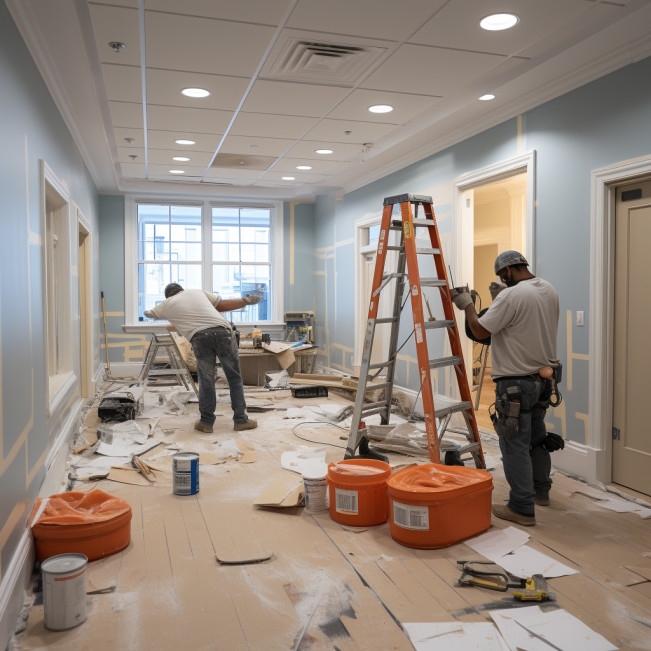
One important consideration when selecting a contractor for commercial renovations is the level of experience in managing large-scale projects. Commercial renovation projects require careful planning, coordination, and execution to ensure that the end result meets the client’s expectations. To help guide you in choosing a reliable renovation contractor for your commercial building, here are four key factors to consider:
Experience:
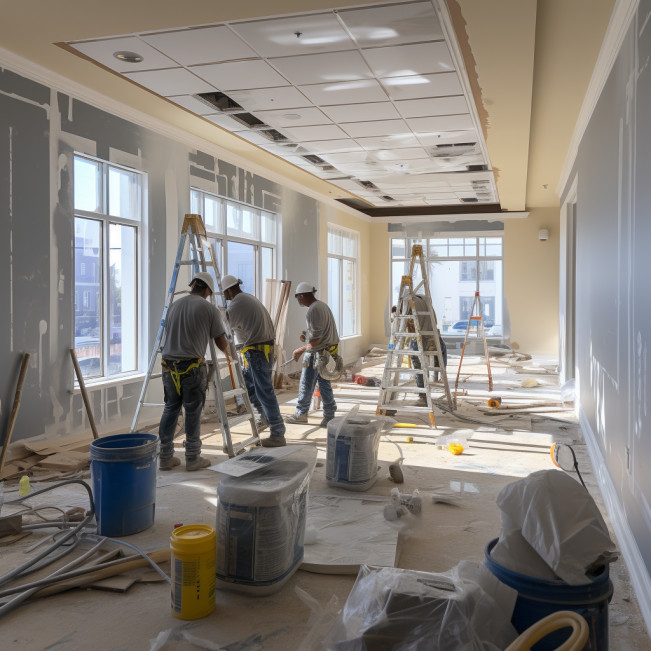
Look for a commercial renovation company that has extensive experience in handling similar projects. This ensures they have the necessary expertise and knowledge to navigate any challenges that may arise.
Qualified Project Managers:
Experienced project managers play a crucial role in overseeing the entire renovation process. They should possess strong leadership skills and be capable of effectively managing resources, schedules, and budgets.

Professional Contractors:
Choose a contractor with a team of skilled professionals who specialize in different aspects of commercial construction projects. This ensures high-quality workmanship and efficient completion of tasks.
Proper Licensing and Permits:
Verify that the contractor holds all necessary licenses and permits required by local authorities for carrying out renovations on commercial buildings.
Key Steps in Planning a Commercial Renovation Project

To ensure a successful commercial renovation project, it is essential to carefully plan and execute key steps in the process.
The first step is to secure the services of a reliable commercial contractor who specializes in renovation projects. This contractor will oversee the entire construction process, working closely with the commercial remodeling contractors and the construction team.
It is important to obtain all necessary permits and comply with legal and zoning requirements before starting any work on the office space.
Additionally, creating a detailed project outline that includes timelines, budget estimates, and design specifications is crucial for effective project management.
Common Challenges Faced During Office Renovation and How to Overcome Them

Common challenges faced during office renovation can be overcome with careful planning and coordination among various stakeholders involved in the project. Office renovation projects, whether big or small, often encounter hurdles that can hinder progress and affect the successful completion of the project.
To ensure a smooth renovation process and the creation of a functional commercial space, business owners should consider the following:
Compliance with building codes: Understanding local regulations and ensuring that all necessary permits are obtained is crucial to avoid legal issues.
Budget constraints: Proper cost estimation and budget management are essential to prevent overspending and delays.
Design coherence: Ensuring that the renovated office space aligns with the overall brand image and meets employees’ needs is vital for productivity.
Timely communication: Effective communication among general contractors, subcontractors, suppliers, and other parties involved is key to resolving issues promptly.
The Role of a Project Manager in a Commercial Renovation Project

The role of a project manager in the successful execution of a renovation project is essential. They oversee the coordination of various stakeholders and ensure effective communication to facilitate timely completion and adherence to quality standards.
In commercial renovation services, such as remodeling office spaces, retail store renovations, or office renovations, a project manager plays a crucial role in managing the construction project from start to finish. They are responsible for overseeing the entire process at the construction site, working closely with potential contractors and an interior designer when necessary.
Additionally, project managers in commercial renovation projects must consider specific requirements unique to different sectors, such as dental offices that require specialized infrastructure.
Tips for Budgeting and Cost Control in Commercial Renovations

Effective budgeting and cost control are essential aspects to consider in the planning and execution of commercial renovation projects. To achieve successful outcomes, it is crucial to collaborate with reliable renovation contractors who have experience in commercial projects.
Here are four tips for effective budgeting and cost control in commercial renovations:
Careful planning: Thoroughly assess the project requirements, timeline, and anticipated costs before commencing any construction work.
Competitive edge: Obtain multiple quotes from different contractors to ensure you get the best value for money without compromising quality.
Cost monitoring: Regularly track expenses throughout the project to identify any deviations from the budget and take corrective actions promptly.
High-quality materials within industry standards: Using durable materials that meet industry standards can lower maintenance costs in the long run.
How to Ensure Minimal Disruption to Business Operations During a Commercial Space Renovation

To minimize disruption to business operations during a commercial space renovation, careful planning and coordination with experienced professionals are crucial factors to consider. Renovating a commercial space, such as a retail store, requires creating a welcoming environment while ensuring business continuity.
The entire process of renovating a commercial space involves various stages, including design elements and new construction. Selecting the right contractor is essential in achieving these goals. A reliable contractor will have the expertise and knowledge to understand the specific needs of the business and execute the renovation accordingly.
Superior communication between all parties involved is vital for keeping stakeholders informed about project progress and any necessary adjustments. By carefully considering these factors and working with skilled professionals, businesses can ensure minimal disruption to their operations during the renovation process.
The Benefits of Sustainable and Green Renovations for Commercial Spaces
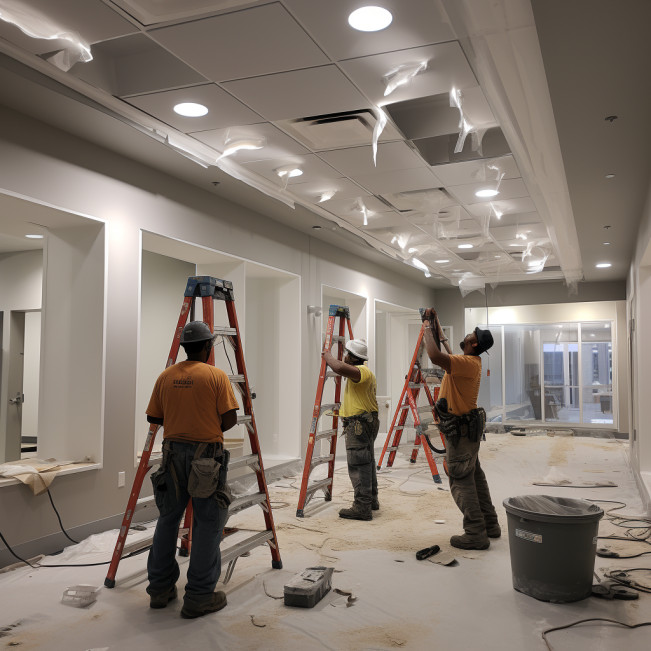
Implementing sustainable and green practices in commercial space renovations provides numerous benefits, such as reducing energy consumption and minimizing the environmental impact of the renovation process. Here are four key advantages of incorporating sustainable and green renovations in commercial projects:
Energy Efficiency: Sustainable renovations aim to optimize energy usage by implementing energy-efficient systems, such as LED lighting, smart controls, and high-performance insulation. This reduces electricity consumption and lowers utility costs.
Environmental Preservation: Green renovations prioritize the use of eco-friendly materials that minimize waste generation and promote recycling. Additionally, they focus on improving indoor air quality by using low-VOC paints, adhesives, and sealants.
Positive Brand Image: Embracing sustainable practices demonstrates a company’s commitment to environmental responsibility, which can enhance its reputation among customers who value sustainability.
Cost Savings: Although upfront costs for sustainable renovations may be higher than traditional methods, long-term savings are realized through reduced operating expenses due to lower energy consumption and maintenance requirements.
Best Practices for Communicating and Collaborating With Renovation Contractors

Collaboration and effective communication between stakeholders and those responsible for renovation activities are crucial in ensuring the successful execution of sustainable and green practices.
When it comes to office design or commercial additions, reliable renovation contractors play a significant role in achieving desired outcomes. To establish good communication channels, it is essential to clearly define project objectives, timelines, and budget constraints from the outset. Regular meetings should be scheduled to keep all parties informed of progress and address any concerns or challenges that may arise during the renovation process.
Collaborating with renovation contractors involves establishing a strong working relationship based on trust and open dialogue. Best practices include providing clear instructions, promptly addressing any issues or changes, maintaining flexibility when necessary, and actively seeking feedback from clients through client testimonials.
Choosing an experienced general contractor known for their expertise and great service can greatly enhance the collaborative process.
Understanding the Permitting and Regulatory Requirements for Commercial Renovations

Understanding the permitting and regulatory requirements for commercial renovations is crucial in ensuring compliance with local laws and regulations. Failure to comply with these requirements can result in costly fines, delays in project completion, or even legal action. To help navigate this complex process, here are four key considerations:
Knowledge of local authorities: It is important to understand the specific permits and approvals required by the local authorities overseeing commercial renovations. This includes obtaining building permits, electrical permits, plumbing permits, and any other necessary licenses.
Comprehensive planning: Properly plan the entire project before beginning any construction activities. This includes creating detailed designs that incorporate all necessary changes such as installing light fixtures or making structural modifications.
Compliance with codes and regulations: Ensure that all renovation work complies with relevant building codes and regulations set forth by local authorities. This may involve meeting fire safety standards, accessibility requirements, or other specific guidelines.
Future growth considerations: Anticipate future growth needs when undertaking commercial renovations. Consider factors such as potential expansions or changes in interior design layouts to minimize future disruptions or additional permit requirements.
Evaluating and Selecting the Right Materials and Finishes for Commercial Renovations

In order to successfully renovate a commercial space, it is essential to carefully evaluate and select the right materials and finishes. This subtopic focuses on the importance of making informed choices when it comes to the aesthetic aspects of a commercial renovation project.
By considering factors such as durability, functionality, and overall design aesthetics, contractors can ensure that they create an appealing and functional environment for their clients. Selecting appropriate materials and finishes not only enhances the visual appeal of the space but also influences its longevity and ease of maintenance.
For instance, choosing high-quality light fixtures can greatly enhance both the ambiance and functionality of a commercial setting. Contractors with over ten years of experience in this field are well-equipped to provide valuable insights into selecting materials that will achieve their client’s dream home or workspace.
Taking these considerations into account allows contractors to do a wonderful job in creating spaces that meet their clients’ expectations while ensuring long-term satisfaction.
The Importance of Quality Assurance and Inspection in Commercial Renovation Projects
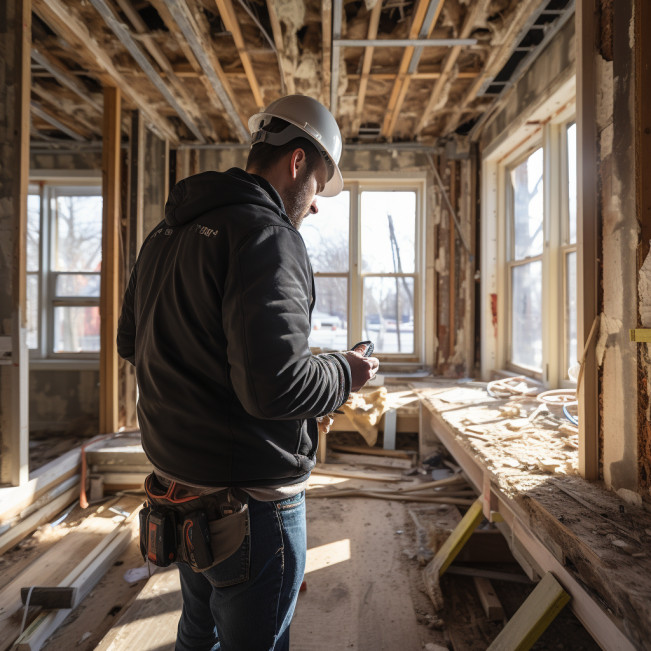
Quality assurance and inspection play a crucial role in ensuring the success and adherence to standards in commercial renovation endeavors. This subtopic highlights the importance of quality assurance and inspection in commercial renovation projects.
To further engage the audience, here are four key reasons why quality assurance and inspection are vital in this context:
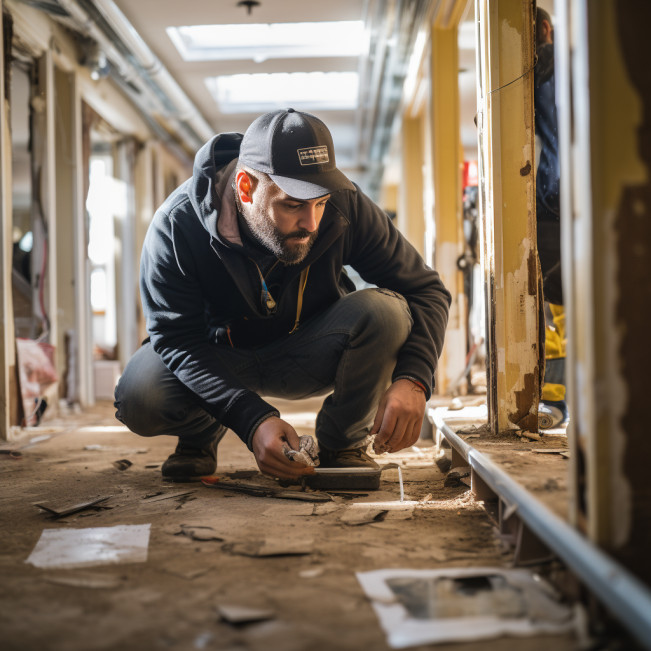
Compliance with regulations: Regular inspections ensure that all renovations meet local building codes and safety regulations.
Quality control: Inspection processes help identify any potential defects or issues early on, allowing for timely corrections.
Client satisfaction: Thorough quality assurance helps ensure that clients receive a final product that meets their expectations.
Cost-effectiveness: Identifying problems during inspections can prevent costly rework or repairs later on.
Frequently Asked Questions
What Are the Most Common Mistakes to Avoid When Hiring a Renovation Contractor for a Commercial Project?
When hiring a renovation contractor for a commercial project, it is important to avoid common mistakes. These may include not conducting thorough research, failing to check references and credentials, neglecting to have a detailed contract, and not setting clear expectations.
How Long Does a Typical Commercial Renovation Project Take From Start to Finish?
The duration of a typical commercial renovation project from start to finish varies depending on factors such as the size and complexity of the project, scope of work, availability of resources, and any unforeseen issues that may arise.
What Qualifications and Certifications Should I Look for When Selecting a Renovation Contractor for My Commercial Project?
When selecting a renovation contractor for a commercial project, important qualifications and certifications to consider include experience in similar projects, appropriate licensing, insurance coverage, and adherence to safety regulations and industry standards.
Are There Any Specific Insurance Requirements I Should Consider When Hiring a Renovation Contractor for a Commercial Project?
Specific insurance requirements should be considered when hiring a renovation contractor for commercial projects. These requirements may include general liability insurance, worker’s compensation insurance, and professional liability insurance to protect against potential risks and liabilities during the project.
How Can I Ensure That the Renovation Contractor I Hire Will Meet My Specific Design and Aesthetic Preferences for My Commercial Space?
To ensure that a renovation contractor meets specific design and aesthetic preferences for a commercial space, it is important to clearly communicate these requirements and expectations. Detailed plans, specifications, and visual references can help facilitate this process.
Conclusion
In conclusion, hiring reliable renovation contractors for commercial projects is crucial for ensuring the success and smooth execution of renovation projects. Factors such as experience, reputation, and adherence to regulations should be considered when selecting a contractor.
Effective planning, communication, and collaboration are essential for overcoming challenges during office renovations. The role of a project manager is important in overseeing the project from start to finish.
Additionally, understanding permitting requirements and selecting quality materials are key factors in achieving satisfactory results. Quality assurance and inspection play a vital role in maintaining high standards throughout the renovation process.

